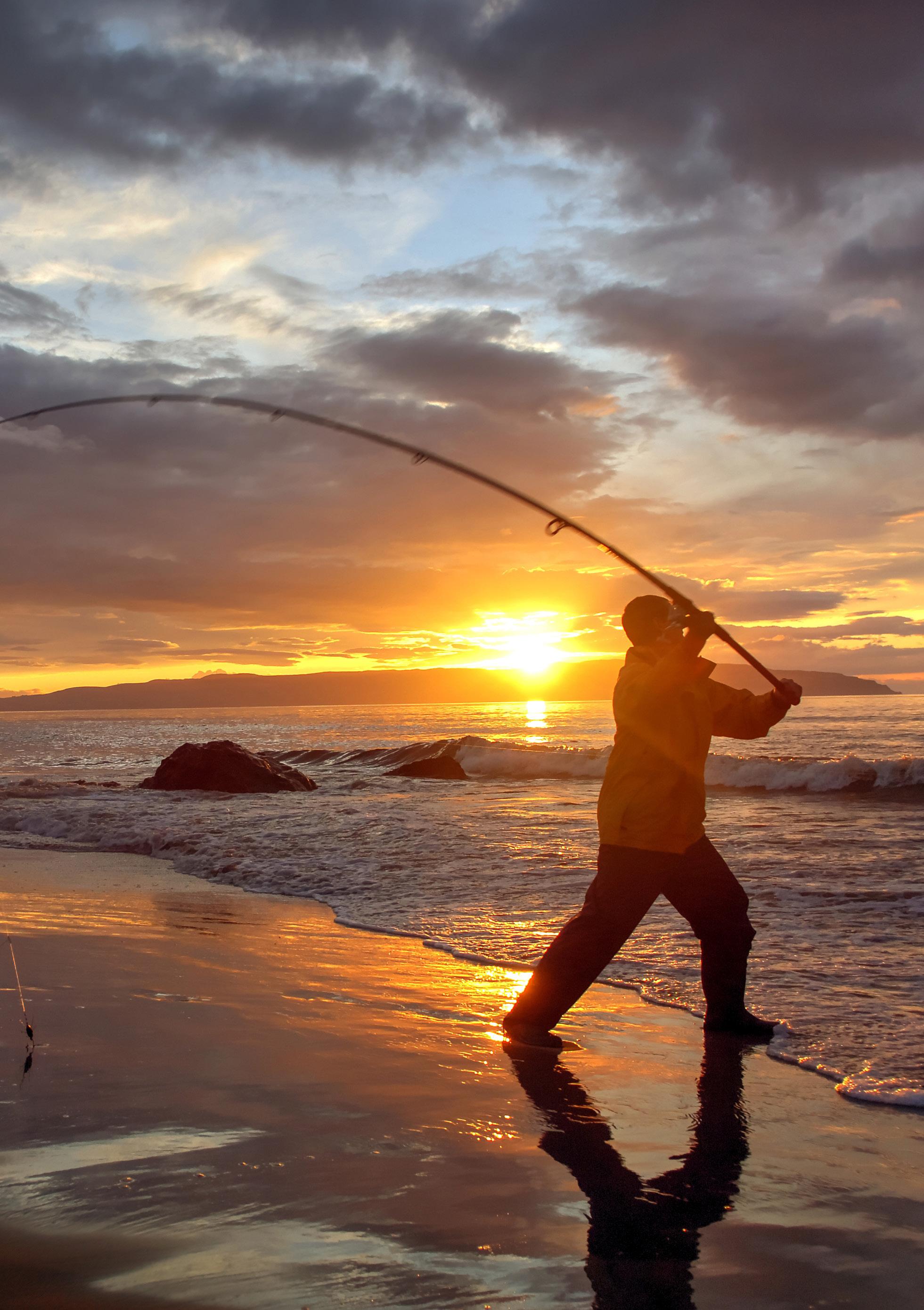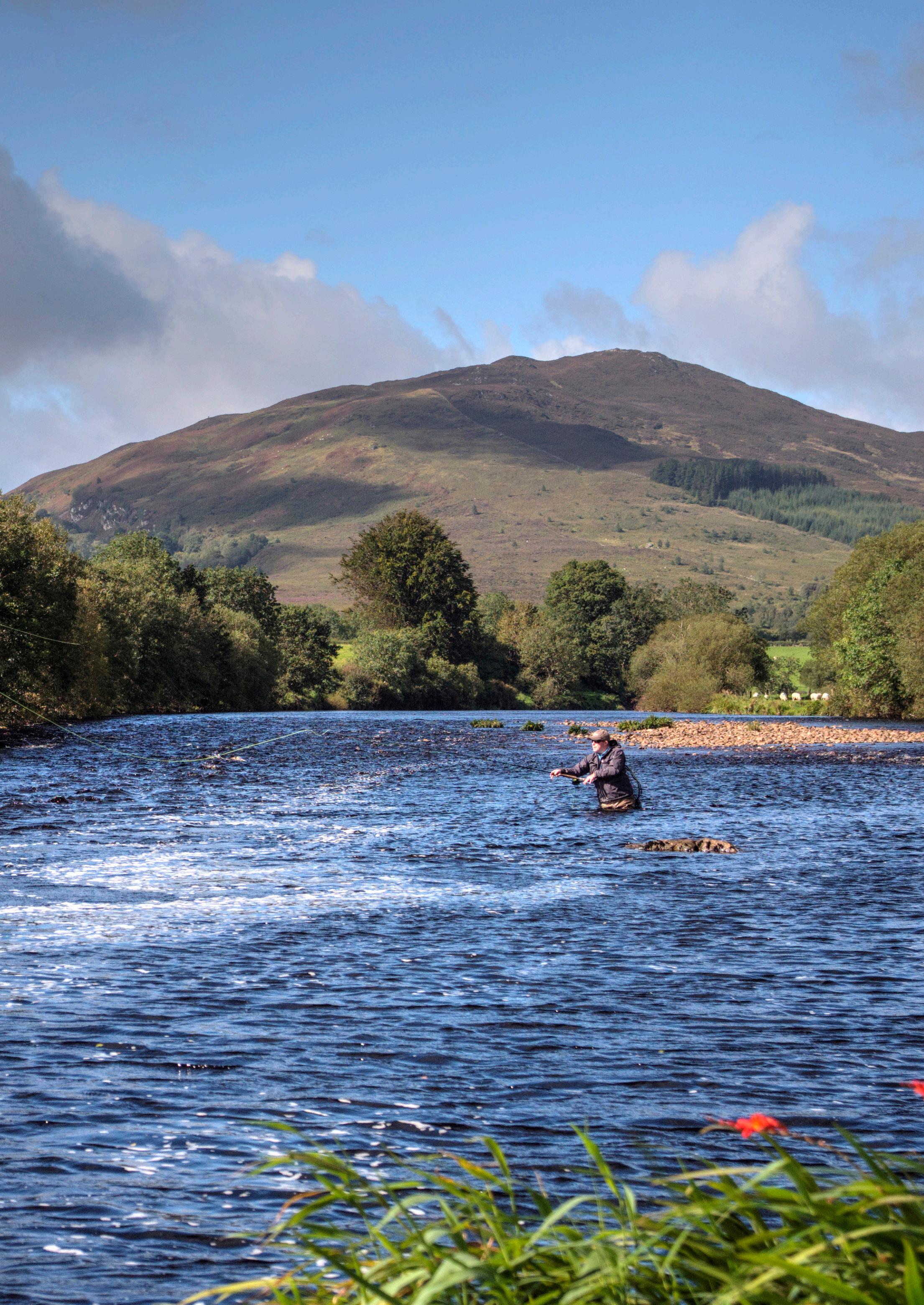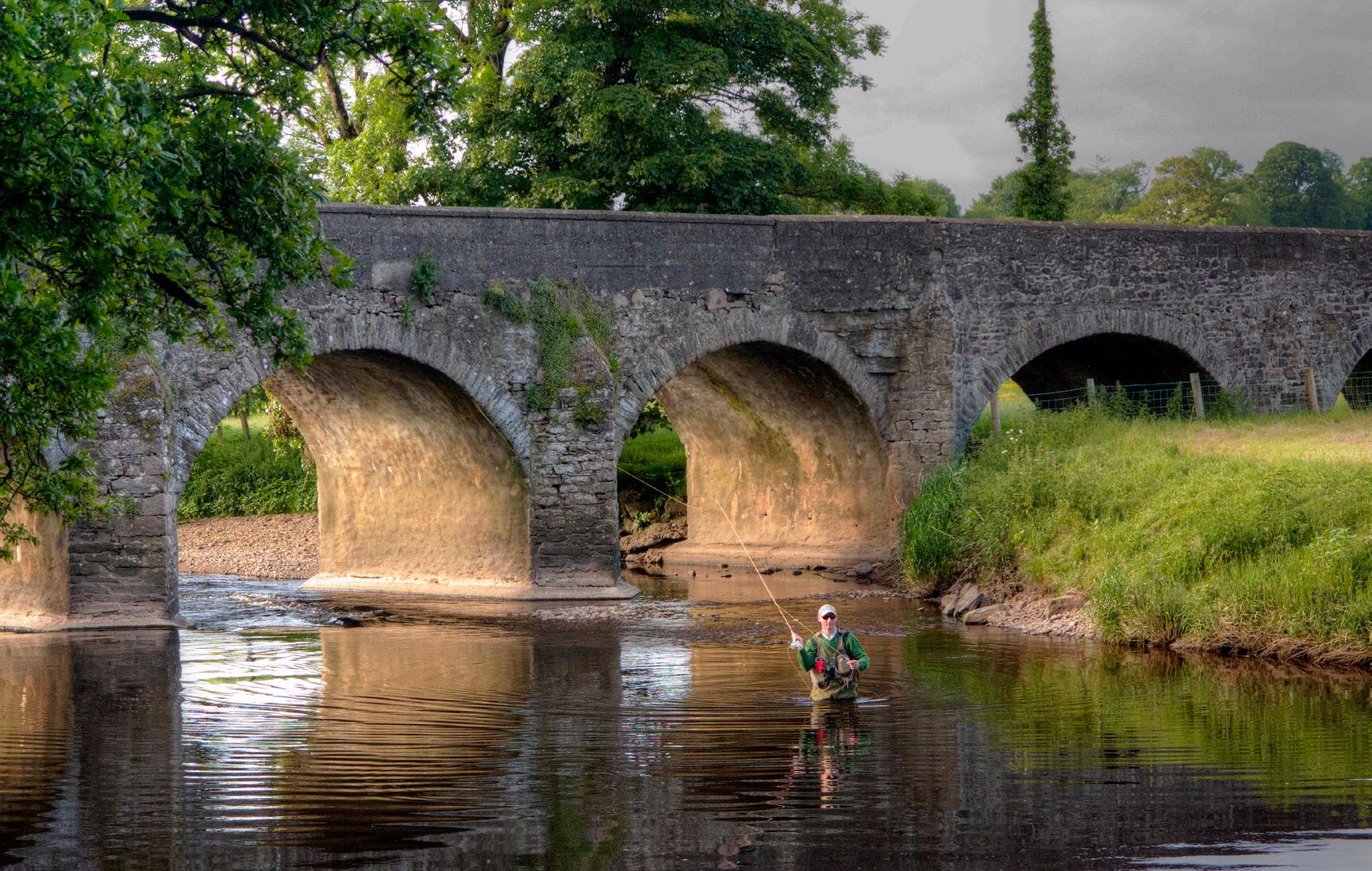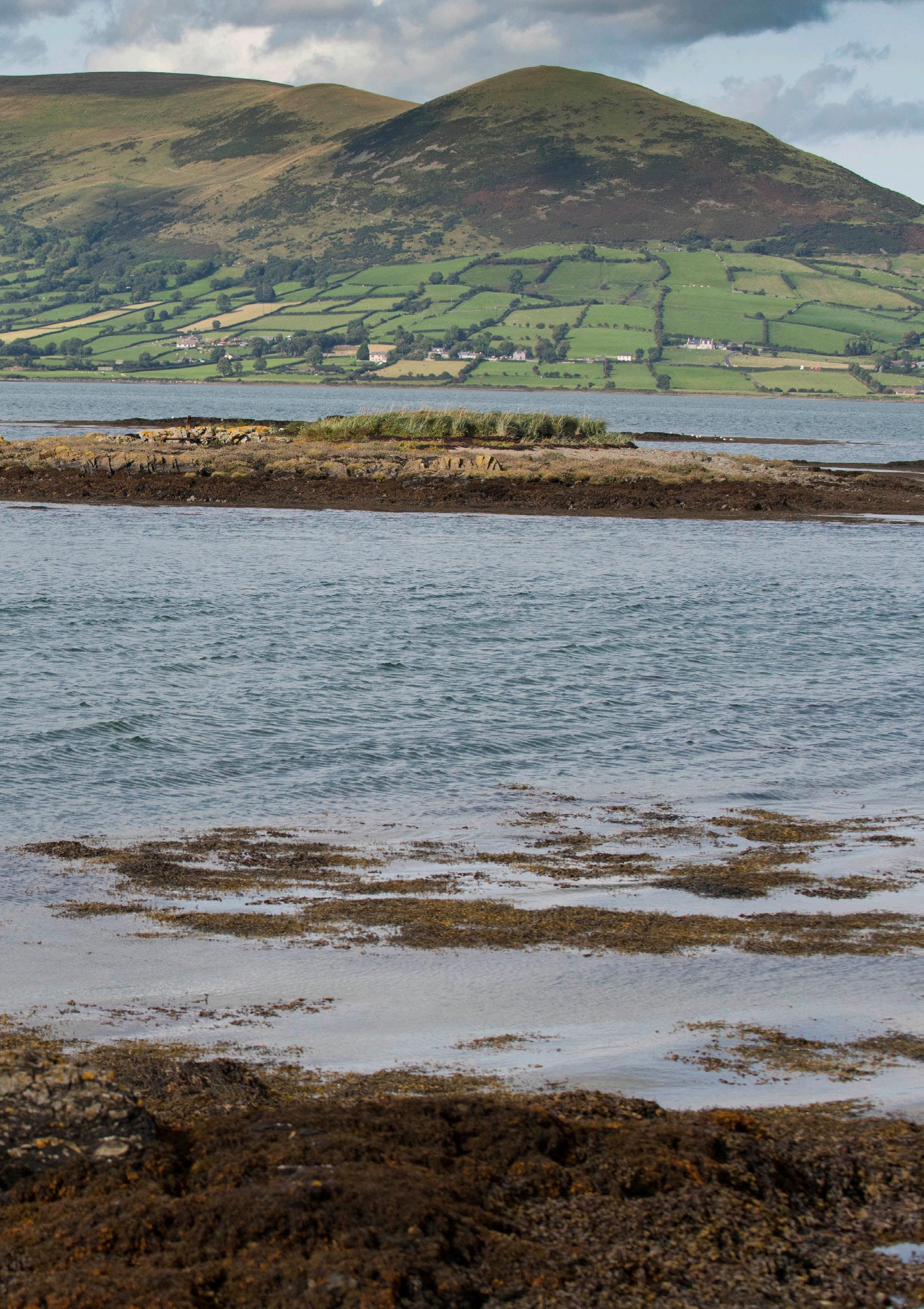
FISHERIES AND ANGLING IMPROVEMENT STRATEGY FOR FOYLE AND CARLINGFORD 2022-2030



FISHERIES AND ANGLING IMPROVEMENT STRATEGY FOR FOYLE AND CARLINGFORD 2022-2030

The international importance of Loughs Agency’s fisheries and angling products is a source of great pride, and we are uniquely placed to help provide social, environmental, and economic benefits for communities in the Foyle and Carlingford catchment areas. We will undoubtedly face challenges as we strive to continue developing the fisheries and angling in our remit areas, but with a clear strategic pathway we can ensure these resources are improved for all.
In developing this Strategy, we have drawn on the knowledge of our own staff who have worked tirelessly to bring lasting benefits to the fisheries and angling in our remit areas. We have also consulted widely with our angling clubs and their national governing bodies to ensure we take their views into consideration, guaranteeing an inclusive nature to this process.
This Strategy aims to deliver a sustainable outcome-orientated approach to Fisheries and Angling Improvement. This can be accomplished by maximising capacity, increasing capability, and delivering quality outputs through positive communication and partnerships. The Agency looks forward to continuing to drive growth while delivering various benefits for the angling community in our catchments.
I would like to thank the Agency staff who have contributed to developing this Strategy with a focus on knowledge, stewardship, and sustainability. The work carried out will help in the delivery of meaningful changes to fisheries and angling in Foyle and Carlingford.
I would also like to thank the many angling clubs and federations who took part in the consultations that helped shape this Strategy. It is now up to us all to work collectively and constructively to increase trust, unity, strength, and resilience for a better future for fisheries and the sport of angling in Foyle and Carlingford.
Sharon McMahon CEO, Loughs AgencySustainably manage, promote and develop the fisheries and resources of the Foyle and Carlingford areas.
Through partnership and inspired science, protecting and developing our fisheries and natural resources.
Knowledge Stewardship Sustainability
Expertise Innovation Ownership Champions Legacy Holistic
In delivering this new Strategy for Fisheries and Angling Improvement, we will recommit to our core values to ensure successful delivery for all. We recognise that these values are of paramount importance in order to achieve the lasting benefits we need to drive change in our fisheries.
For generations, angling has played an important role in the Foyle and Carlingford catchments. The origins of many of our towns and cities can be traced back to the utilisation of fish as a stable food source and as an economic driver. Angling has continued that tradition of making the most of the rich natural resources available right on our doorstep. The angling products found within our catchment areas are exceptionally diverse and of the highest quality, rivalling anywhere else in the world. Foyle and Carlingford are home to magnificent populations of Atlantic salmon, sea trout, and brown trout whose daily struggle to fulfil their life cycle in the face of a multitude of natural pressures and man-made impacts are well known. Game angling in Foyle and Carlingford for these species is of the highest standard and is renowned for its accessibility and the unspoilt surroundings from the spate rivers cascading down from the Sperrin, Mourne, and Bluestack mountain ranges to the remote hill loughs. Sea anglers are captivated by the wide array of choices available within such a small area in the Foyle with a mesmerising number of inshore wrecks combined with beautiful sandy beaches and rugged rocky coastlines. Both Carlingford and Foyle are famous for their large shark populations with migratory tope and resident porbeagle sharks regularly caught throughout the year. Newry Canal forms the backbone of a coarse angling product that can rival any other, and with renewed interest in the improvement of other waters the sport is on an upward trajectory within our remit areas.
Angling in Foyle and Carlingford is an immensely popular recreational activity, and the Agency sells in excess of 8,000 annual licences for game and coarse anglers alone. When this is combined with the numbers of sea anglers, who are not required to be licensed, it is easy to see that the sport is of massive importance, plays a key role in people’s lives, and contributes much to society in these areas. Angling has an economic benefit to Foyle and Carlingford through the associated spend by local and visiting anglers
on tackle, bait, equipment, guides, accommodation, food, and drink. In addition, it has environmental and social benefits for Foyle and Carlingford in that it helps empower local communities by connecting with the environment while fostering a deep respect for nature.
Anglers derive many benefits, direct and indirect, from their sport, and to many the simple act of catching a fish is just one of a range of reasons for partaking in the activity. Many anglers find the immersion into the wild, surrounded by nature and water, to be calming, restorative and beneficial in maintaining overall health and wellbeing. Great friendships have been formed within angling clubs, which helps to tackle loneliness while vibrant and resilient local community groups can eventually become environmental champions.
Many angling clubs operate training and coaching programmes and encourage novice and junior anglers to take part in the sport. They also play a role in upskilling anglers in techniques, casting or associated activities such as fly-tying or rig-making. The age profile of our angling community is not as skewed towards the older age groups as we have sometimes been led to believe. Junior members make up 15% of the total membership of angling clubs in Foyle and Carlingford, and there is a good representation of all age classes in most clubs. However, female members make up a small proportion within angling clubs, and clubs generally have very few members with a disability.


Angling has a long history in Foyle and Carlingford and several of our present-day angling clubs have been in existence for over 70 years. These clubs have survived through a World War, economic recessions, and the Troubles, and have been a constant amongst these turbulent times for their anglers. These clubs have amassed a huge amount of knowledge about their fishing waters and the fish that rely on them. They have played a key role through generations of anglers with many families passing down their techniques, equipment, and knowledge of fish and fishing through the ages. Anglers in Foyle and Carlingford are quite rightly proud of their fishing heritage and pedigree, and angling has played an important role in the development of their cross-community interactions. It is widely accepted that angling is a great leveller, and this is an important aspect of the sport that helps to break down societal barriers and bring people from all backgrounds together for one purpose. The development of strong cross-community links through angling cannot be ignored, and this future aspiration should be high on the sport’s agenda in Foyle and Carlingford.
Angling can be a constant source of enjoyment for people while helping them feel connected to the natural environment. This deep connection can provide an assurance to people about their place and the role they play. Many anglers become empowered to protect rivers, lakes and seas because of their love of angling, and this can spur them on to join other groups who are actively engaged in protecting and restoring the natural world. The sense of ownership that is acquired through these community-led initiatives can be beneficial for all. The skills and interests that are learnt through angling tend to remain for life and become an important piece of the identity of many people.
Angling groups play an important role in creating community resilience through taking ownership of issues facing fish and fisheries in their area. Anglers are very knowledgeable about the impacts that litter, pollution, and illegal fishing can have on their waters and the result this will have for the long-term sustainability of stocks that they rely on for their sport. The social benefits of angling are also well recognised by these angling groups, and the need to attract more anglers to continue the path towards achieving a thriving angling community in the future is understood. The benefits of angling must be recognised, and angling groups should be adequately trained and qualified to deliver for their communities. The advent of citizen science programmes has given many anglers the ability to actively engage in measures that deliver quality data for fisheries management and to feel like they are part of the solution.
The Just Transition needed to manage the impacts of climate change is high on the agenda for all anglers. They observe first-hand the changing nature of the environment through climate change, whether it is through the presence of more warm water species in the sea around our coasts or the impact on rainfall events and the magnitude of our storms which are affected by climate change. Anglers are committed to mitigating the impacts of climate change and many clubs are engaged in practical projects to help improve our natural carbon storage capacity through the likes of tree-planting programmes and erosion control projects on rivers. Due to the collective interest in the health of fish stocks, on which angling as a sport depends, there is a willingness amongst the angling community to adapt to the changing climate.
The approach to the management of angling and fisheries improvement by Loughs Agency to date has been fragmented, and delivery in a cohesive and coherent manner has been missing.
The fisheries improvement function has primarily been assigned to the Conservation and Protection Directorate, including the delivery of the legislative process, fisheries science programmes and fishery habitat enhancement work. The core function of ensuring that we have sustainable fish populations on which to base our angling product has not been to the fore and has fostered a resentment amongst our anglers, angling clubs and their representative groups.
The improvement of angling access and infrastructure has been fragmented and mostly linked to funding programmes such as the Sustainable Development Fund (SDF), which has not operated since 2016. The need to ensure all angling access works funded through the Agency are digitally recorded on a GIS database is essential going forward and information on the nature of the structure, need for insurance, lifespan estimates and succession planning for access infrastructure is needed. A clear set of guidelines on the construction specifications for angling access is needed to ensure all are of the highest quality and provide the assurance needed to cover any insurance liability.
The Agency has also been involved with marketing and promotion of angling in Foyle and Carlingford over the last 21 years. In recent years the Agency’s attendance at these shows was coordinated with the Angling Ireland branding in collaboration with IFI and DAERA and this has helped to maximise the all-Island angling promotional effort. International angling shows are currently in a period of flux due to the Coronavirus pandemic, however several are coming back online for 2022.
The operation of training programmes for angling coaches and guides has also been delivered by the Agency over the past 10 years. This has helped seed the placement of guides and coaches throughout the Foyle and Carlingford catchments and helped to stimulate
further organic growth in coaching programmes from clubs and coaching groups. There is less need for the Agency to play a central role in operating these angling coaching courses and it is becoming clear that the angling federations are best placed to operate these programmes in the future with a cascading effect throughout the grassroots of the sport coming from the national governing bodies. These coaching programmes were a substantial cost to the Agency and the benefits were difficult to fully measure over the medium to long term.
A clear scientific strategy on habitat enhancement for stock improvement is needed with recommended interventions based on best practice, monitoring obligations and measurable outcomes. A link between spend on angling infrastructure and fishery habitat enhancement needs to be considered in any future work programmes and a more collaborative and a holistic approach is needed to achieve maximum value for money.
Extensive consultation with the angling clubs in 2021 has allowed us to constructively engage with these stakeholders and to record their criticisms with the current approach. Poor communication was highlighted as the main concern by our stakeholders. Many did not fully understand what our role is in relation to angling and fisheries improvement. It was felt by many clubs that the Agency was not interested in angling and the development of the sport at a grassroots level.
It is clear that the Agency needs to form a solid identity as the competent fishery authority for the Foyle and Carlingford areas and assert its role on angling and fishery improvement matters. The Agency needs to be proactive in its engagements with its stakeholders and ensure that dynamic communication systems are in place that address the needs of angling clubs and other groups.

Loughs Agency is at a frontier moment in its approach to angling and fishery improvement. The extensive consultation carried out with angling clubs and federations during 2021 has provided a basis for developing a closer working relationship with these stakeholders and has provided a foundation for developing partnership working to achieve world class angling products into the future in Foyle and Carlingford. A regime shift in the communications framework employed by the Agency to both engage with anglers and disseminate information to anglers is necessary. The adoption of a holistic approach to angling and fishery improvement, based on the cornerstone of increased fish stocks through habitat improvement works, will require the Agency to both fund and resource a highly motivated and skilled team to drive forward the necessary changes. The Agency should be the best at what we do and strive to ensure that we deliver high quality outputs that are measurable in their contribution towards angling and fishery improvement. This new approach provides the basis for delivering on our core objective of providing social, economic and environmental benefits to the catchments.

Cross-DirectorateWorking
Base Communications & Partnerships
Effective Communication
Dynamic Stakeholder Outreach
Productive Partnerships
Successful Delivery
SMART Objectives
High Quality Outputs
ecnellecxElanoitarepO
Raising the Standard
Sound Evidence
• Productive Capacity
• Harness Our Expertise
• Science-Led Decisions
• Digitally Enabled
• Cutting-Edge Projects
Maximising Potential
• Increase Habitat Capacity
• Thriving Fish Stocks
• Vibrant and Resilient Angling Clubs
• Effective Protection
• Increasing Angler Numbers

Foster a culture of dynamic stakeholder engagement and ensure a unified approach to partnership working.
1. Build cohesive relationships with stakeholders through dynamic communication
• Put in place a dynamic communication system that provides real time feedback on projects to stakeholders.
• Ensure an open channel of communication is always available and all communications are recorded with stakeholders and actioned for follow up internally.
• Foster an atmosphere of mutual trust and respect between stakeholders and the Agency.
2. Transparency and open communication are key to delivering for all
• Clear messaging from the Agency is needed on operational issues that impact on our stakeholders.
• Ensure all consultation exercises are done with full disclosure of all the relevant facts and a review of the decision-making process when concluded.
• Commit to accepting that practical challenges and difficulties may result in some errors at times.
• Learn from our mistakes and accept criticism from stakeholders.

3. A unified collaborative approach internally is needed to achieve our objectives
• Foster a culture of cross-directorate working and embed a unified approach.
• Ensure work programmes have clear leads, roles, deliverables, and are assigned by the project management at the outset.
• Promote positive engagement with other statutory bodies with relevant remits to influence changes that will benefit fisheries.
• Partner with schools, disability groups, tourism bodies, health trusts, and environmental NGOs to deliver change.
4. A partnership approach to fisheries improvement is needed to deliver sustainable outcomes
• Harness the wealth of knowledge and capacity of stakeholders to deliver positive outcomes for their fisheries.
• Support the development of productive partnerships with third sector organisations such as angling clubs, NGOs, and angling bodies.
5. Use of external communication advisers to deliver best practice communications to our stakeholders
• Utilise the experience of independent external advisers to drive forward regime changes in communications management within the Agency.


Using innovative science and fisheries expertise to measure success and sustain fisheries into the future.
1. Ensure a sound evidence base for the delivery of fisheries improvement
• Development of a science strategy to address major issues in a calculated way.
• Adopting scientific objectives that are founded on best practice and ensures we become the best at what we do.
• Use of scientific criteria to measure the success of fishery improvement interventions and provide a monitoring framework for determining the return on investment.
2. Harness and improve in-house expertise, knowledge base and encourage cross-directorate working
• Promote the development of cross-directorate working groups on fisheries improvement to deliver coherent and unified approaches.
• Tap into the existing wealth of knowledge that has built up within the Agency’s staff.
• Improve in-house knowledge base through regular staff training and development activities.

3. Use modern technology to deliver data fit for the digital age
• Promoting the use of digital technology in our fisheries management approach.
• Tapping into new technological advancements to generate better information for fisheries management.
• Using technology to reduce the cost of data acquisition and monitoring work.
4. Promotion of involvement of anglers in citizen science programmes within our catchments
• Support for angling clubs and other groups to engage in citizen science programmes to help build a sense of ownership and encourage stewardship of the fisheries resources.
• Ensure citizen science outputs are of the highest quality and meaningful.
• Development of data sharing between anglers, angling clubs, and the Agency.
• Recognise the fisheries knowledge held by local recreational anglers and promote the use of this capital.

Harnessing the capacity of our recreational fisheries resources using a holistic approach to deliver maximum social, economic and environmental benefits for all.
1. Increase habitat capacity and maximise productivity
• Using evidence-based management interventions to maximise fish stock levels in all catchments.
• Aim to increase fish stocks to maximum achievable levels in line with the productive capacity of the system.
• Adopting a best practice catchment-based approach to ensure we deliver ecologically coherent fishery improvement works.
2. Create vibrant and resilient angling clubs
• Support the development of improved club governance and training for committee members.
• Promote diversity and access for all within clubs and their committees to foster an inclusive, welcoming atmosphere within clubs.
• Encourage angling federations and clubs to deliver coaching programmes to ensure continual recruitment of new anglers.
• Support clubs to access funding available for sports development and fisheries improvement projects.
3. Ensure there is effective fisheries protection
• Put in place the strongest fishery protection measures possible to ensure fish stocks are sustained to their maximum potential.
4. Increase the recognition of the importance of angling
• Highlight the role of angling in improving health and wellbeing and investigate the options for social prescribing.
• Ensure anglers have a greater role in participating in the decision-making process across government.
• Highlight the impacts of new developments and legislative changes on angling.
5. Increase angler numbers, diversity and access
• Promotion of current and new national novice/junior angling initiatives being inclusive to all.
• Promotion of angling for the disabled initiatives and disabled angling access works. Audit of disabled angling facilities.
• Ring-fence angling licence fee monies for sustainable improvement of fisheries.



Ensuring operational excellence is embedded in the delivery of our fisheries improvement function.
1. Ensure meaningful outcomes are delivered for all fisheries improvement projects
• Plans must have SMART objectives included in their framework from the outset.
• Pre- and post-monitoring of fisheries improvement works such as habitat improvement to evaluate the benefits.
• Ensure project management frameworks are in place to deliver at pace.
2. Benchmark our work
• Strive to achieve operational excellence throughout our delivery.
• Become recognised as the best at what we do in the fisheries and angling improvement realm.
3. Deliver high quality outputs that are value for money and deliver meaningful results for fisheries
• Aim to deliver the maximum return on investment for all fisheries and angling improvement projects.
• Ensure costs are commensurate with high quality outputs.
• Ensuring appropriate economy of scale in fisheries improvement projects.
• Ensuring projects result in long-term meaningful changes to fish populations and the angling product.
4. Achieve greater customer satisfaction
• Ensuring that our stakeholders’ needs are met.
• Putting in place mechanisms to ensure we deliver on issues raised by stakeholders.
5. Quantify the value of angling and fisheries to Foyle and Carlingford
• Encourage development of academic studies on the economic value and non-monetary contribution of angling to society.
• Ensure data is collected on a regular basis to allow the increasing value of angling to be measured and the impacts it has on different demographics.


Improvement has been developed to provide a framework for key priorities and future actions that are required to ensure sustainable improvement for recreational fisheries in Foyle and Carlingford for the period 2022-2032.
This Strategy has been developed by the Agency to ensure the proper cognisance is taken of the importance of fisheries and angling improvement when discharging our function for the improvement of Foyle and Carlingford for commercial and recreational purposes. This Strategy will work under the framework of our Strategic Direction for New Decade 2020-2030 and be complimentary to our future corporate and business plans.
It has been informed by consultation with our staff, angling clubs, and federations based within the catchment areas we manage and has drawn on the feedback from an online questionnaire that was issued during 2021 to all clubs and fisheries. This feedback has allowed us to prioritise actions needed to help address the needs of our stakeholders and make the improvements necessary to systems and processes we employ in our fisheries and angling improvement approach. It is hoped that the delivery of this strategic plan will help to bridge the gap that currently exists between stakeholders and the Agency and reinforce our commitment to the improvement of our fisheries resources.

This Strategic Plan presents the high-level aspirations of the Agency under the four key pillars to foster better stewardship, sustainability, and knowledge of our fisheries in Foyle and Carlingford.
Several key priority areas have been identified for each pillar and strategic actions have been developed to allow delivery. These priority areas will be developed further, and specific action plans put in place with SMART objectives to measure success.
This Strategy will become the foundation for an evolving fisheries and angling improvement structure within the Agency which will respond to our stakeholders’ needs.
The Strategy will be reviewed on a regular basis to ensure it is agile and delivering on the key pillars.